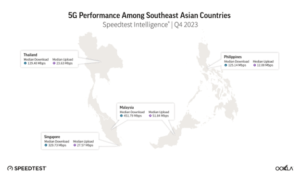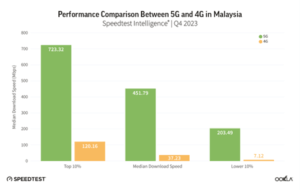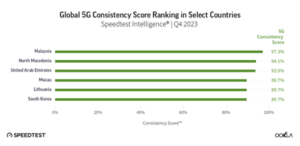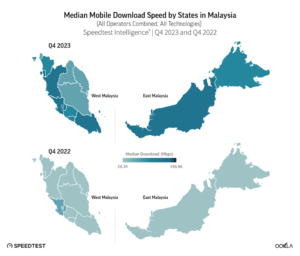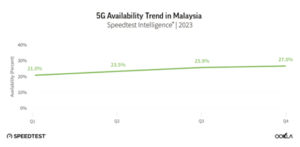Affandy Johan | March 18, 2024
Malaysia has adopted a unique approach to its 5G rollout by implementing a Single Wholesale Network (SWN) model through the formation of Malaysia’s Digital Nasional Berhad (DNB) in 2021. Following this, all major service providers in Malaysia have signed an access agreement with DNB and have successfully launched 5G services. In this article, we examine the current state of 5G in Malaysia and assess its impact on the user experience.
Key Takeaways
- Malaysia continues to lead in Southeast Asia in terms of 5G network performance. Malaysia’s 5G median download speed of 451.79 Mbps is higher than Singapore’s 329.73 Mbps, Thailand’s 129.40 Mbps, and the Philippines’ 125.14 Mbps, according to Ookla’s Q4 2023 Speedtest Intelligence®
- Malaysia’s 5G network scored the highest Consistency Score™ globally for Q4 2023 at 97.3%. The result indicates that 97.3% of Speedtest Intelligence samples on Malaysia’s 5G networks exceeded the consistency threshold, which is currently set at a minimum download speed of 25 Mbps and a minimum upload speed of 3 Mbps. In comparison, other top countries, such as North Macedonia and the United Arab Emirates, reported lower consistency scores of 94.1% and 93.9%, respectively.
- Malaysian 5G users experiencing “slow” download speeds enjoy speeds at least five times faster than the 4G median download speed. When looking at the bottom 10% of 5G download speed Q4 2023 results, Speedtest Intelligence data indicates that 5G speeds in the 10th percentile clocked in at 203.49 Mbps, a big uplift compared to 4G median download speed, which was 37.23 Mbps. For further context, Malaysia’s median 5G download speed was 451.79 Mbps.
- 5G Availability in Malaysia increased from 21.0% in Q1 to 27.0% in Q4 of 2023. Despite the increase, Malaysia is still lagging behind its neighboring countries, such as Singapore and Thailand, which have 53.8% and 45.5% 5G availability, respectively. Malaysia is only slightly higher than the Philippines, at 26.2%.
Malaysia’s 5G continues to outperform its Southeast Asian neighbors
Since its launch more than two years ago, Malaysia’s 5G network has consistently performed well, making it one of the best-performing 5G networks worldwide. According to Ookla’s Speedtest Intelligence® Q4 2023 data, Malaysia continues to outperform other Southeast Asian countries in 5G network performance despite the expected decrease in performance due to more user adoption and congestion. The data shows that Malaysia achieved a 5G median download speed of 451.79 Mbps, which is higher than Singapore’s 329.73 Mbps, Thailand’s 129.40 Mbps, and the Philippines’ 125.14 Mbps. Malaysia also reported the fastest 5G median upload speed among its Southeast Asia neighbors, at 51.84 Mbps, compared to 27.57 Mbps for Singapore, 23.63 Mbps for Thailand, and 12.00 Mbps for the Philippines.
In May 2023, the Malaysian government announced its decision to shift from a Single Wholesale Network to a Dual Network Model for the country’s 5G deployment. The second 5G network is aimed to establish redundancy for 5G while paving the way for more robust and reliable 5G services in the country. The transition to dual network model was expected to begin in January 2024 after DNB achieved 80% 5G coverage. At the end of December 2023, DNB reported that 5G coverage in populated areas throughout the country had surpassed 80.2%. However, as of March 2024, there has yet to be any news from the Malaysian government regarding the establishment of the second 5G network.
Lower 10% of 5G speeds outperform median 4G download speeds by at least 5 times
While the current 4G network meets most users’ needs for daily tasks, such as browsing, streaming, and online communication, it still falls short of the significant uplift in performance offered by 5G, which can enhance the user experience even further. While median 5G speed is a useful measure to gauge the midpoint of the user experience on 5G networks, it does not provide a complete picture of the actual improvement over 4G. To demonstrate the improvements Malaysia’s 5G network provides, we compared 5G download speeds in the bottom 10th percentile of our 5G results with the median download speed on 4G LTE.
Speedtest Intelligence data from Q4 2023 reveals a substantial variance in performance between 4G and 5G networks in Malaysia. Even when we examine the lower 10% of download speeds experienced by 5G users, which stood at 203.49 Mbps or slower, this was still at least 5 times faster than the median download speed for 4G users, of 37.23 Mbps. When we compare 5G and 4G median download speeds, Malaysia’s median 5G download speed of 451.79 Mbps was 12 times faster than that of 4G.
Malaysia leads in 5G Consistency globally
While high speeds are crucial, providing consistent quality of service and an excellent customer experience are also significant indicators of network quality. Ookla’s Consistency Score™ is a metric used to identify networks that provide consistent quality of service. It reflects the percentage of a provider’s data samples that meet minimum thresholds for download and upload speeds, depending on the type of network. The Consistency Score threshold for mobile 5G is currently set at a minimum download speed of 25 Mbps (the minimum recommended speed for streaming in 4K) and a minimum upload speed of 3 Mbps.
According to Ookla’s Q4 2023 report, Malaysia’s 5G network achieved the highest 5G Consistency Score globally for that period, with a score of 97.3%. The other top countries on the list are North Macedonia, with a score of 94.1%, and the United Arab Emirates, with a score of 93.9%.
5G has a positive impact on Net Promoter Scores in Malaysia
The Net Promoter Score (NPS) is a tool that gauges customer loyalty and satisfaction. NPS is a key performance indicator of customer experience, categorizing users into Detractors (those that score 0-6), Passives (scores between 7 and 8), and Promoters (score of 9-10), with the NPS representing the percentage of Promoters minus the percent of Detractors, displayed in the range from -100 to 100.
In our recent article discussing whether 5G networks are meeting consumer expectations, we found that 5G users, on average, rated their network operator with NPS scores that were universally higher than those for 4G LTE users. Having one of the top 5G download performances globally, it’s no surprise that we see a largely positive picture of Malaysia’s current 5G network. Ookla’s Speedtest Intelligence data showed a stark difference in NPS when comparing users on its 4G LTE network to those on 5G during Q4 2023. NPS for 5G scored 26.39 against -34.00 for 4G. This translates to an uplift of 60.39 basis points.
5G driving overall mobile performance improvement across all states
Following the launch of the 5G network in Malaysia, operators have tackled some of the issues faced in their 4G networks, such as network congestion and spectrum constraints. Our recent report highlights how Malaysia’s 5G network has helped to increase the country’s overall mobile median download speeds and helped it climb up in Speedest’s global mobile rankings.
All states in Malaysia have experienced at least 1.45 times increase in their overall mobile speeds across all technologies. In Q4 2022, Kuala Lumpur, Malaysia’s capital city, reported a median download speed of 37.60 Mbps across all technologies. The city’s median download speed increased by 1.6 times, at 63.62 Mbps by Q4 2023. Malaysia’s government administrative city, The Federal Territory of Putrajaya, emerged as having the fastest mobile median download speeds in the country at 190.86 Mbps, an increase of more than 2.5 times compared to Q4 2022 period, which was at 61.24 Mbps.
Steady improvement in 5G Availability, but adoption still needs to catch up with other markets
Speedtest Intelligence 5G Availability represents the percentage of 5G-active devices that spend the majority of their time connected to 5G networks. In 2023, 5G Availability in Malaysia showed a gradual increase every quarter, starting from 20.9% in Q1 and rising to 26.9% in Q4. This 6 percentage point increase could be attributed to DNB’s active expansion of 5G coverage. Additionally, the increase was stimulated by greater smartphone availability and the introduction of new 5G plans by operators.
While 5G Availability in Malaysia has increased, it still falls behind its neighboring countries with commercial 5G networks. As of Q4 2023, Malaysia’s 5G Availability stands at 27.0%, which is almost half of Singapore’s (53.7%) and 20 percentage points lower than Thailand’s (45.5%). Malaysia’s 5G Availability is only slightly higher than that of the Philippines, an archipelagic country with a 5G Availability of 26.2%.
In our previous report on 5G in Malaysia, we highlighted the opportunity to increase 5G adoption by focusing on users with 5G-capable devices who have yet to access a 5G network. While acknowledging the impressive performance of the 5G network, DNB and the operators must further improve 5G adoption in the country. We will continue to monitor the development of 5G in Malaysia and assess its impact as the country transitions from a single wholesale network to a dual network setup. If you want to learn more, we invite you to subscribe to Ookla Research™ to be among the first to read our analyses.
Ookla retains ownership of this article including all of the intellectual property rights, data, content graphs and analysis. This article may not be quoted, reproduced, distributed or published for any commercial purpose without prior consent. Members of the press and others using the findings in this article for non-commercial purposes are welcome to publicly share and link to report information with attribution to Ookla.



